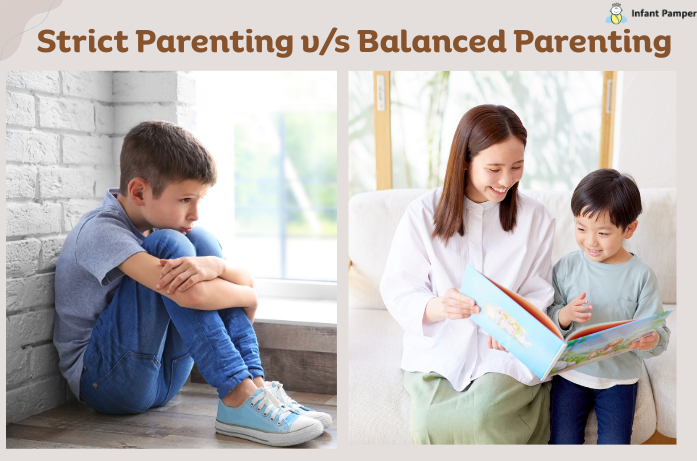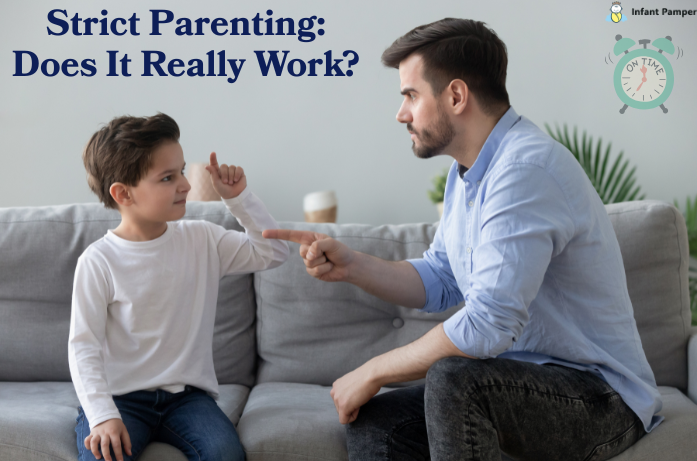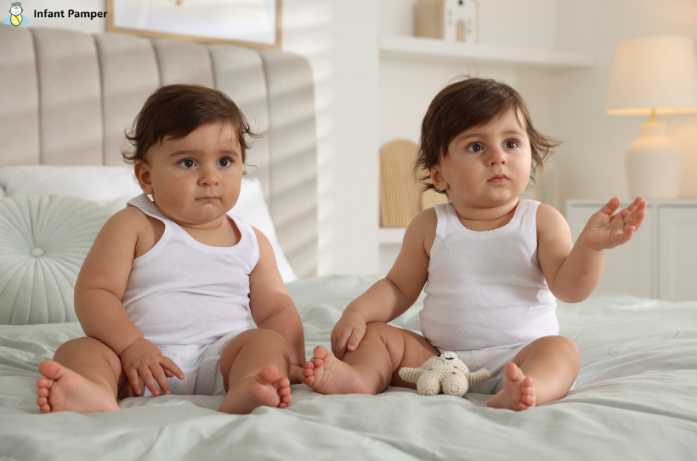Every parent wishes the best for his or her child. We all want to raise respectful, disciplined, successful, happy children. In seeking to accomplish this, many of us ask the question of how. We encounter different approaches to parenting, and one that comes up for discussion is the idea of strict parenting. It’s a technique many of our own parents or grandparents employed, often with the idea that a strong hand makes for a well-behaved child.
But in today’s world, with our growing understanding of child psychology, we have to ask the tough question: Does strict parenting really work in the long run? Is it the key to raising a responsible adult, or does it come with hidden costs?
Let’s dive deep into the world of strict parenting, explore what experts like Diana Baumrind and the American Psychological Association (APA) say, and find a healthy, effective path forward for our families.
What Do We Mean by “Strict Parenting”?
Authoritarian parents believe that a firm, no-nonsense approach will raise children who are well-behaved, respectful, and successful. But modern research urges us to look deeper, beyond short-term obedience, to understand what this parenting style truly does to a child’s development.
When we talk about strict parenting, we’re usually referring to what child psychologists identify as the authoritarian parenting style. This approach was first identified by researcher Diana Baumrind in the 1960s and is defined by a few key characteristics:
- High Demands, Low Responsiveness: Authoritarian parents expect a lot out of their kids. Under their rigid rules, they require absolute adherence. However, they usually provide little warmth, feedback and emotional support
- “Because I Said So”: The universal motto of the dictator parent. Rules are not subject to discussion or negotiation. The parent has the last word, and there’s not a lot of space for a child’s input, or feelings.
- Focus on Punishment: I believe that generally discipline is more for punishment than education. The idea is to apply punishment, often punitive, to make a child behave, rather than train a child (or rather young person), self-control and to understand the reason why rules must be obeyed.
- One-Way Communication: The parent is the one who talks and the child is the one who listens, and listens in utter compliance. There is practically no give-and-take or open discussion.
This is where strict parenting discipline methods become distinct from authoritative parenting, which balances structure with empathy.
1. Where does strict parenting begin?
Strict parenting is not a new phenomenon, it is a tradition. For generations, parents have thought they need to be strict to prepare children to cope with a tough world. This perspective has been influenced by cultural values such as obedience, discipline and respect, and for many families, these are values that are still revered greatly today.
Today, terms like “spare the rod, spoil the child” “children are to be seen and not heard” echo from many households. But as our understanding of child development and emotional intelligence has grown, experts have begun to question this old-fashioned approach.
2. What the Research Really Says About the Downsides of Strict Parenting
While strict parenting may create obedient children in the short term, modern psychology paints a more complex picture when it comes to long-term effects.
Research by renowned psychologist Dr. Diana Baumrind, who first identified parenting styles, found that authoritarian (strict) parenting often results in children who follow rules, but at a cost. These children tend to be less happy, more anxious, and struggle socially.
The American Psychological Association (APA) echoes these concerns, pointing out that overly rigid parenting is linked to:
- Increased anxiety and fear: Perpetual critique or pressure can make kids afraid of making mistakes, or folly, and shut down emotionally.
- Lower self-esteem: Children with who are rarely commended and frequently punished may begin to feel they’re never “good enough.”
- Lower academic motivation: These children don’t learn to learn, they learn because if they don’t, they’ll get punished.
- Trouble developing healthy relationships: Emotional coldness at home can make it more challenging for children to open up or trust others.
- Rebellion during teen years Ironically, children who’ve been raised in overly strict homes may revolt once they are out on their own because they never were allowed to make decisions or have a say.
- Weakened parent-child bond: And when parents are unresponsive and love is not affine, your kid may reckon himself misunderstood, disassociated, KL or ok not adored, for all the best wishes their parents had.
In short, the negative effects of strict parenting can create kids who seem well-behaved but may silently struggle with stress, insecurity, and loneliness.

3. Strict Parenting vs. Balanced Parenting
Psychologists suggest there is a better alternative, authoritative parenting (not to be confused with authoritarian). According to UNICEF, this style offers the structure children need, but with the emotional warmth they crave.
| Strict Parenting (Authoritarian) | Balanced Parenting (Authoritative) |
| Rigid rules with little flexibility | Clear rules, but room for discussion |
| Obedience through fear of punishment | Discipline with explanation and empathy |
| Low emotional connection | Strong emotional bond |
| One-way communication | Open, two-way communication |
| Children often anxious or withdrawn | Children more confident and self-reliant |
The authoritative parent still sets limits, but they also listen, explain and support. Rather than “because I said so,” it’s “here’s why this rule is important.” This creates respect and trust, not just obedience.
4. A Better Way: The Authoritative Approach
So, if being too strict is harmful, does that mean we should have no rules at all? Absolutely not! The opposite of authoritarian parenting isn’t permissive parenting (low rules, low demands). The sweet spot, according to decades of research, is authoritative parenting, Studies from the National Center for Biotechnology Information highlight that this style of parenting supports healthier emotional development, stronger self-esteem, and more resilient coping skills in children.
It looks the same, but they’re entirely different.
Authoritative parenting is like being a firm but fair guide rather than a rigid drill sergeant. Like authoritarian parents, authoritative parents have high expectations and clear boundaries. The crucial difference lies in their high responsiveness.
An authoritative parent:
- Sets Clear and Consistent Rules: Children know what is expected of them, which helps them feel secure.
- Listens and Communicates: They value their child’s opinion. While the parent still has the final say, they are willing to listen and explain the reasons behind their rules. A conversation might sound like, “I understand you want to stay out later, but your curfew is 10 PM because I need to know you’re safe and you need to get enough sleep for school tomorrow.”
- Uses Discipline to Teach: When a child breaks a rule, the focus is on natural and logical consequences, not on punitive punishment. The goal is to help the child understand their mistake and learn how to do better next time.
- Is Warm and Nurturing: They provide plenty of love, support, and encouragement. They create an environment where children feel safe to be themselves, make mistakes, and learn.
Research, including studies from Vanderbilt University, highlights that children raised by authoritative parents tend to be happier, more capable, and more successful.
5. Practical Tips for Finding the Balance
Moving towards a more authoritative style doesn’t happen overnight. It’s a journey of being mindful and intentional in our interactions. Here are a few ways to start:
- Explain the “Why”: Instead of just saying “Because I said so,” take a minute to explain the reasoning behind a rule. “You need to hold my hand in the parking lot because cars are moving around and I want to keep you safe.”
- Offer Limited Choices: Give your child a sense of autonomy by offering two or three pre-approved options. “It’s time to get dressed. Do you want to wear the blue shirt or the red one?” This respects their desire for independence while still ensuring the main goal (getting dressed) is met.
- Validate Their Feelings: You don’t have to agree with your child’s behavior to acknowledge their emotions. “I know you’re angry that we have to leave the park, and it’s okay to feel sad. It’s time to go home for dinner now.”
- Focus on Connection Before Correction: When your child is upset or has misbehaved, take a moment to connect with them emotionally before jumping into discipline. A hug or a calm moment together can make them much more receptive to what you have to say.
FAQs
1. What’s the difference between being strict and having high standards?
High standards guide with warmth; strictness demands obedience with control.
2. My parents were strict and I turned out fine. Why is it bad now?
Many adults do well, but modern research links strict parenting to higher long-term anxiety. We simply know more now.
3. In an emergency, is it okay to be authoritarian?
Yes. In emergencies, safety comes first. That’s protecting, not a style of parenting.
4. How can I switch from a strict style without seeming “soft”?
Keep your rules firm, but explain the reasons. Being consistent and fair shows strength, not weakness.
5. What is a quick example of a logical consequence?
The consequence should fit the action. Example: If you misuse a toy, you lose that toy for a while.
The Final Word
Parenting is both the hardest and most rewarding journey. The urge to practice strict parenting often comes from love and a desire to protect. But true discipline is not about control, it’s about guidance and connection.
Authoritative parenting offers that balanced path. By setting clear, consistent boundaries within a warm, supportive environment, we raise children who are not only respectful, but also resilient, confident, and emotionally secure. When we replace fear with understanding and replace punishment with patience, we give our children the greatest gift: the freedom to grow into their best selves.
Disclaimer: This article is for general informational purposes only and is not a substitute for professional medical or psychological advice. For any specific concerns about your child, please consult a qualified health provider.
At Infant Pamper, we’re here to support you with real advice, not judgment.
Explore more articles, share your thoughts, or pass this along to another parent who needs it. Let’s grow, learn, and raise emotionally strong kids, together.




